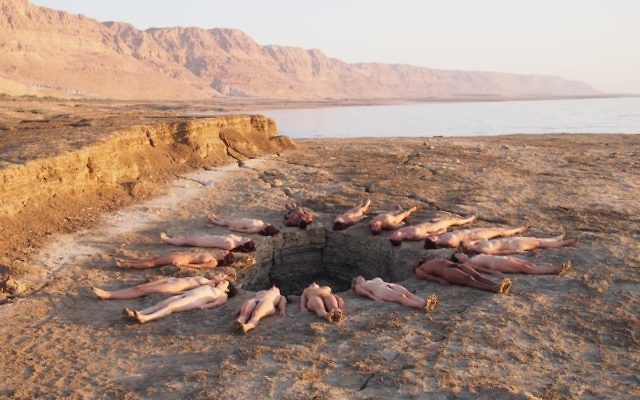Our View: Dead Water
Israel just got some unexpected exposure: 15 men and women photographed nude on and in the salty soil alongside the shrinking Dead Sea.
The shoot Sunday, Sept. 11, was the latest act of guerrilla art by Jewish photographer Spencer Tunick, who has spent the past quarter-century staging such events for his own mix of art and politics. We normally don’t pay attention to his stunts, but this one carries a message that shouldn’t be ignored: The Dead Sea is in big trouble, and it is time to act.
“Israel is a unique place that I hold close to my heart and is the only country in the Middle East where I can be allowed to have proper freedom of expression,” Tunick said in revealing to the press his return to the Dead Sea five years after another nude shoot there. “I care deeply about the future of the Dead Sea and hope that my presence and involvement here can propel the Israeli government and local activists to take real, measurable action to save the Dead Sea.”

Tunick focused on the destruction wrought by sinkholes, including the loss of the site of his 2011 installation, Mineral Beach. But those holes are a symptom of the Dead Sea’s long-term, possibly fatal disease: It is drying up because of greatly reduced water flows down the Jordan River.
Clive Lipchin, who heads the esteemed Arava Institute for Environmental Studies’ Center for Transboundary Water Management, provided the scientific foundation for Tunick’s artistic flare. “The threat to the Dead Sea’s existence is more tangible than ever,” Lipchin said. “The Dead Sea we once knew doesn’t exist anymore.”
He said some of the damage is irreversible, and the window is closing on the opportunity to repair what can be addressed for one of Israel’s top tourist attractions and one of the world’s great natural wonders.
The frustration is that even as Israel has largely freed itself from the dangers of drought through technology, conservation and reuse, the Dead Sea has not benefited because its health requires international cooperation. Its level is dropping more than 3 feet per year, and its surface area has shrunk by 30 percent the past 20 years — the Oslo Accords era.
The Dead Sea is one of the most visible victims of the failure of Israel and the Palestinians to achieve a peace agreement. Along with borders, refugees and Jerusalem, the allocation of natural resources — none more important than water — remains both an obstacle to an Israeli-Palestinian accord and a hostage to the hostility.
The shrinking Dead Sea, like Palestinian children born and raised in refugee camps, serves as a symbol of the failure of all sides to put aside politics and propaganda in the pursuit of reasonable solutions.
The immediate hope lies with the plan to connect the Red Sea to the Dead Sea by canal, along with the construction of a massive desalination plant, to provide fresh water to Jordan, the Palestinians and Israel and pump salt water into the Dead Sea. The project is slowly moving toward initial contracts, and the exact route and the full consequences remain controversial.
But the naked truth is that Israel, its neighbors and all who care about the Dead Sea need to make the dream of that canal a reality.




comments